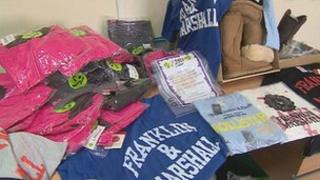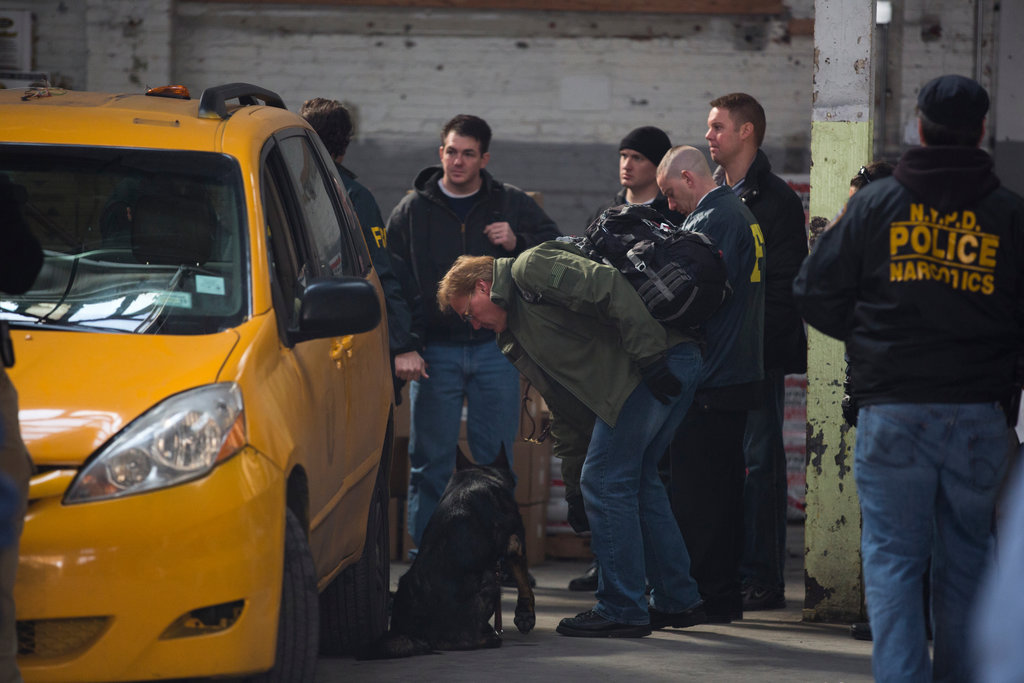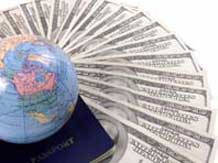Zambia: Hologram Arrival to Boost Piracy Fight
ZAMBIA: The holograms which will be affixed on audio-visual products are scheduled to arrive in the country next week. This came to light when Information and Broadcasting Services Permanent Secretary Amos Malupenga led a delegation to OPSEC, a UK based global company specialised in providing anti-counterfeit and brand solutions.OPSEC which has now completed the works was engaged by the Zambian Government to supply five million holograms. The delegation was in Newcastle to undertake a pre – inspection of the hologrammes before shipment to Zambia. Mr Malupenga said Government was delighted that the problem of piracy that has been a perpetual issue will now be dealt with by the force it deserves. “Piracy continues to be a key challenge in the country and has been a major reason for the losses that the music and video production industry have continued to suffer on the market,” he said. He said the holograms will not only help enforcement agencies to check duplication and adulteration but will also help consumers in identifying original products.The permanent secretary said soon after the arrival of the holograms, the Government will set up a taskforce to oversee the implementation process of the security tags. Mr Malupenga further said that Government will launch an anti – piracy awareness campaign to sensitise the public on what the hologram is and how it works. Intellectual Property Specialist Kingsley Nkonde thanked the Patriotic Front (PF) government for finally bringing the hologram in the country. He said the hologram project was embarked on eight years ago by the previous administration, adding that he was glad that the PF government chose to priorities the project and complete it within a short period of time. OPSEC Marketing Manager Trevor Willis assured the delegation that the hologram was tamper proof. He explained that once affixed on audio-visual products and if a person attempted to remove it, it denigrates into pieces. Government announced plans in 2005 to affix a hologram, a security feature on audio-visual products in a bid to certify the originality of the works and curb the problem of piracy.
http://allafrica.com/stories/201302230254.html
Lear MoreFake brand items flood markets
The recent recovery of fake watches of leading international brands in Chandigarh has opened up a Pandora’s box. The duplicate goods industry includes apparel, shoes, crockery, cold drinks and cosmetics of international brands. It all started when major companies like Tommy Hilfiger, Tag Heuer, Puma and Polo looked at their sales volumes in Chandigarh and observed a mysterious slump. Failing to identify a reason for such a state of affairs, they hired a local company to investigate the matter on their behalf. That is how Romesh Dutt, director of Speed Search and Security Networks Private Limited, an individual property rights company, filed complaints and conducted raids. Company officials said they have recovered fake material worth Rs 10 crore in the city over the last one year. “Over one year, we recovered fake clothes, shoes, watches and cosmetics of leading brands, worth Rs 10 crore from different places in Chandigarh. The seized material is now case property and is in police custody. But more fake products are readily available in various shops in the city. They are selling products without any check,” Romesh Dutt, who also runs a detective agency, told TOI. “The material is usually brought to the city once or twice a month by trucks. The fake goods are then stored in godowns and supplied to dealers, who supply the same to shops. Besides customs officials, tour and travel operators are also involved in the racket. We are collecting documentary evidence against them and will make a disclosure soon,” Romesh Dutt, who also runs a detective agency said. Last week, police raided two shops in Sector 22 and recovered fake watches worth more than Rs 80 lakh in the international market. Ashish Kapoor, deputy suprintendent of police (central) said, “We conducted the raids last week after a tip-off. We are working on ascertaining places where the fake products are available and will continue conducting raids.”
Modus operandi Traders don’t display many duplicates of leading brands in their shops. They have a loyal clientele who have been regulars for years. Every month, at least four to five trucks carrying duplicate clothes and accessories reach Chandigarh their main targets are college students and gullible people.
Trade route Fake watches, cosmetics, crockery and shoes are smuggled from China and Thailand. The goods reach seaports in Kolkata, Gujarat and Mumbai. From there, smugglers take possession of containers and send the material to Chandigarh via road, Fake denim and jeans of leading brands are manufactured in Delhi while fake shirts and t-shirts are stitched in Chennai, from where the material reaches Chandigarh via road from Chandigarh, the material is supplied to different parts of Punjab, Haryana, Himachal Pradesh and Jammu and Kashmir.
Lear More
eBay fake clothes trader from Yate given suspended sentence
A man from South Gloucestershire has been given a suspended sentence for selling counterfeit clothing on eBay. When trading standards officers raided 33-year-old Richard Roosbey’s home in North Common they found fake Hollister shirts, Ugg goods and Casio watches. Enforcement officers said Roosbey’s records showed he sold items worldwide.Roosbey pleaded guilty to offences under the Trade Marks Act 1994 and was sentenced to nine months in jail, suspended for two years. Sentencing him at Bristol Crown Court, Judge Michael Longman said: “You ran a profitable business buying items cheaply and selling them on eBay. “The majority of your customers would have thought they were buying branded goods.” ‘Big operation’ The warrant to search Roosbey’s South Gloucestershire home was issued after counterfeit Zumba clothing was sold to a trading standards officer as part of a “test purchase”. “We suspect that Mr Roosbey was buying most of his stock, if not all of it, from China,” said Neil Derrick, from South Gloucestershire Trading Standards.”And, as the judge said, he would have had to have been incredibly naive to have believed that what he was buying was genuine.”This was a big operation. When we raided his home he had a year’s worth of postal receipts in his possession and it basically tots up to over £3,000 worth of postage in a year.”Roosbey was also ordered to carry out 250 hours of unpaid work. A hearing under the Proceeds of Crime Act is also due to take place at the end of March.
http://www.bbc.co.uk/news/uk-england-gloucestershire-21512460
Lear MoreDelhi: 3 held for smuggling liquor
The west Delhi police on Monday arrested three people for their alleged involvement in smuggling of illicit liquor and supplying it in several areas in Uttar Pradesh. Police recovered 66 cartons of liquor, each containing 12 bottles, from a mini truck, which was being used to transport the illicit liquor. Jiyaul Hasan, Parvez and Mohammad Faizan were arrested by a team led by Inspector Raj Kumar, station house officer (SHO) of the Mundka police station when they were taking huge amounts of liquor to Sambhal, UP, in a mini truck. The illicit liquor bottles were concealed in cartons used for packing spare parts of vehicles . V Renganathan, additional CP (west), said the arrests were made following efforts made to curb such illegal business in the west district. The team of the Mundka police station was conducting checking of vehicles at a police picket when they nabbed the three men with their mini truck. During interrogation they disclosed that there is a lot of difference in the prices of liquor in Haryana and UP. On purchasing the liquor from Haryana and then selling it in Sambhal, UP, provides about 100% profit excluding transportation and other expenses. Hence, they were involved in such illegal business, added Renganathan.
Lear More
3 Men Arrested in Scheme to Sell Counterfeit Car Parts
Federal authorities arrested three men Tuesday on charges of selling counterfeit brake pads and other automotive parts to repair shops, including those that service the city’s yellow taxis and licensed livery cabs, officials said. The brake pads were deceptively packaged to appear as though they were made by Ford, General Motors and other leading manufacturers, the authorities said. Agents from theFederal Bureau of investigationraided several locations on Tuesday in connection with the case, including a warehouse in Astoria, Queens. The defendants, Shashi Malhotra, Fadi Kilani and Richard Dininni, were arrested at their homes in New Jersey and Pennsylvania, the authorities said. As of Tuesday afternoon, at least two of the men had not been arraigned. They face charges of conspiring to traffic in counterfeit goods. The top official in the F.B.I.’s New York office, George Venizelos, characterized their conduct as fraud. The United States attorney in Manhattan, Preet Bharara, described the products as “the automobile replacement parts equivalent of designer knockoffs,” but suggested that the quality of the products themselves“may have been no different from many other generic parts sold every day.” Indeed, there was little immediate evidence that the brake pads were faulty or that drivers or passengers had been endangered. TheTaxi and Limousine Commissiontests the brake systems of the city’s taxi fleet three times a year, and the failure rate has been relatively level in recent years, a commission spokesman, Allan Fromberg, said. “There is no evidence to suggest any negative effects from the generic parts in question,” Mr. Fromberg said. “Our inspection process is such that if it passes muster with our highly trained inspectors and our state-of-the-art equipment, it’s as safe as any part regardless of the manufacturer.” The commission’s top official, David Yassky, said in a statement that “the public may remain confident in the safety of New York City taxicabs,” but he added that “successfully keeping counterfeiters like these at bay is crucial.”
Lear More
In 10 years, developing nations lost $5.86 trn
Even as developing countries struggle to bring back illicit money stashed abroad, Global Financial Integrity (GFI) has brought out a startling report. Between 2001 and 2010, developing countries lost $5.86 trillion, owing to tax evasion, crime and corruption, the report said. India recorded an outflow of $123 billion. GFI said this money had flowed to tax havens and banks in advanced countries. In 2010, 150 developing countries recorded illicit outflows of $858.8 billion to tax havens. This was below the all-time high of $871.3 billion in 2008. In 2009, the outflow stood at $776.0 billion. According to GFI’s report, ‘Illicit Financial Flows From Developing Countries: 2001-2010’, for 2010, India did not rank among the top 20 countries, in terms of outflows. The report was co-authored by GFI lead economist Dev Kar and GFI economist Sarah Freitas. With illegal outflows of $420.36 billion in 2010 alone, China was the top illicit capital exporter during the decade. For the entire 10-year period, India was ranked eighth. Countries such as India are struggling to find ways to tackle illicit outflows and bring back such funds lying abroad. India is embroiled in tax rows with several companies, including Vodafone, Shell, Nokia, IBM and Sanofi-Aventis. It is also revising its double taxation avoidance agreements with Mauritius and other countries. “Astronomical sums of dirty money continue to flow out of the developing world into offshore tax havens and developed country banks,” said GFI Director Raymond Baker. He blamed offshore secrecy jurisdictions and developed Western economies for facilitating illicit outflows from developing countries. “This is an astronomically large amount of money. We’re talking about nearly $6 trillion, which could have been invested in healthcare, education, and infrastructure in the world’s poorest countries. Nearly $6 trillion could have been used to pull people out of poverty and save lives,” he said. The estimates are conservative, as these don’t include trade mispricing in services, same-invoice trade mispricing, hawala transactions and dealings conducted in bulk cash, Kar said. “This means much of the proceeds of drug trafficking, human smuggling and other criminal activities, which are often settled in cash, are not included in these estimates.” In its latest edition, The Economist carried a cover page editorial and a 10-article expose on the damaging role of anonymous shell companies, banking secrecy and lax money laundering regulations and enforcement in the US, the UK and offshore tax havens. The magazine flayed developed countries, including the US and the UK, for complacency in dealing with illicit capital flows headed to leading tax havens. There are 50-60 tax havens, concentrated primarily in the Caribbean, Europe, the Indian and Pacific oceans and regions in the US (such as Delaware and Miami). These help millions of paper companies evade taxes in their respective countries. The magazine also urged Western economies to “focus…on cleaning up their own backyards and reforming their tax systems”.
Lear MoreCustomers Get Burned By Counterfeit Goods From Amazon’s Marketplace
The online shopping website Amazon.com is popular for discounted items, but it’s also a marketplace for knockoffs. “We think the amount of fraud and counterfeit goods that were sold to consumers was between $110 and $140 million just this past holiday season,” James Lee of the Consumer Fraud Center in Santa Monica said. “We expect if nothing is done, that number is probably going to double by next year.” Sandra Torres of Canyon Country is among the hundreds of customers who bought a counterfeit version of a hair straightening iron called the InStyler. “I put it on my hair and immediately it was really hot. It started sizzling my hair,” Torres said. “I could hear, and I could see the smoke coming out of it.” InStyler, which is based in Culver City, brought a lawsuit against Amazon in 2011 to stop selling the device— real or fake. “This is not just like a handbag. This thing can be dangerous,” one of the creators of InStyler, David Richmond, said. The attorney representing the maker of the straightener, Tom Peistrup, alleges more than 20,000 knockoffs have been sold through Amazon. Lee compares the company’s marketplace to the Wild West. “You don’t know what you’re getting,” he said. “There’s no law, there’s no system of justice.” Lee said the manufacturers of knockoffs, in places such as China, can bypass customs and border security agents by sending goods directly to Amazon’s warehouses. He’s seen knockoffs of prescription drugs, popular headphones such as Beats by Dr. Dre and even designer shoes. InStyler is working to find Amazon customers who bought fake devices and replace them with authentic ones. Torres recently received hers. “I know I’m not going to buy anything from Amazon anymore, it’s ridiculous,” she said. CBS2 reached out to Amazon for comment but there has been no response.
Lear MoreFake cosmetics flood the market
A local cosmetics distributor, Black Opal Zimbabwe, has expressed concern over the rise of counterfeit products imitating some of its brands.The company, an official distributor of the US-originated brand, Black Opal Cosmetics said research had proved that counterfeits were dangerous to users.Counterfeits are popular among Zimbabwe’s poor because they are cheap.“Fake make-up is unregulated and leading researches on seized products established that these beauty products contain dangerous compounds such as lead and cadmium,” said Black Opal Zimbabwe director of marketing, Tatenda Mutseyekwa. “Although original products may have traces of these elements, these will be in tiny and proven-to-be-safe concentrations, unlike in counterfeit products.”Mutseyekwa said researches had established that long-term exposure to cadmium could result in impaired kidney function while lead could affect the central nervous system.“No one is testing them for safety and no one cares if the ingredients are fit for use,” he said.Products being traded as Black Opal have flooded the country over the past decade. Unscrupulous dealers are taking advantage of their high demand and selling counterfeit products in their shops and flea markets.“We are just saying, don’t label your cheap and dangerous products ‘Black Opal’ or the common misspelled ‘Black Opel’. That’s trademark infringement and piracy,” he said.Mutseyekwa said as the holders of the trademark and distributorship in the country, Black Opal Zimbabwe were in the process of rolling out a programme to address the issue of counterfeit products.“We are also working with various stakeholders including but not limited to police, the Revenue authority and the Health ministry to tackle the issue of fakes,” he said.According to Interpol, syndicates that manufacture fake cosmetics used the proceeds to fund terrorism, among other organised criminal activities.
http://www.thestandard.co.zw/2013/02/17/fake-cosmetics-flood-the-market/
Lear More2 held for selling fake watches
Two youths were arrested for selling fake watches under the banner of two leading brands in Sector 22 on Friday. Over 980 spurious watches were recovered from two shops – Jain Watch Company and Ravindra Watch Company – in Sector 22. Accused Manoj Kumar, an employee with Jain Watch Company, and Ravinder Pal of Ravindra Watch Company were remanded in judicial custody for 14 days.The raid was conducted by a joint team of police and representatives of leading brands. Police officials said prima facie all recovered watches were found to be duplicates with fake logo impressions of leading brands, and the accused reportedly confessed procuring them from Delhi.
Lear MoreDubai and Ajman police authorities seize 6,200 counterfeit toners
Brother International (Gulf) FZE has lauded the successful joint operation with enforcement authorities from Dubai and Ajman that raided a warehouse in Ajman, which resulted in the seizure of more than 6,200 counterfeit ‘Brother’ toner cartridges and other consumables , Based on accounts by company officials, Brother International was tipped off few traders that were selling counterfeit ‘Brother’ toners in Dubai. This vital information was relayed to authorities inUAE, which resulted in successful raids. The raided companies admitted that the seized counterfeit toners were supplied by another Dubai trader who kept the pirated products in a warehouse in Ajman. With the help of the authority in Ajman the warehouse of the counterfeit toners were revealed and raided.
Lear More


